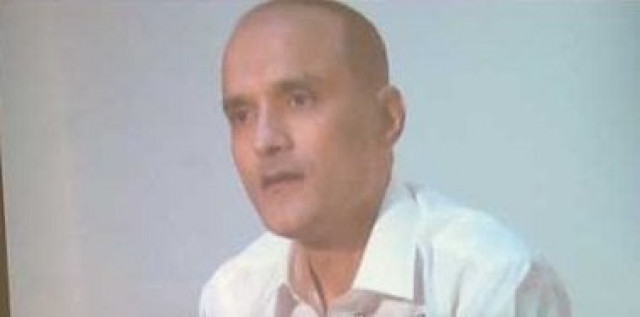Jadhav’s case at ICJ: Civil-military leaders discuss legal battle at The Hague
Review names of senior judges to be appointed as ad hoc judge at the UN court

Kulbushan Jhadav. PHOTO: AFP
The National Security Committee (NSC) meeting, chaired by Prime Minister Nawaz Sharif, discussed Pakistan’s options and preparation to defend its stance in the case whose next hearing is scheduled on June 8, sources privy to the meeting told The Express Tribune.
Pakistan to appoint ad hoc judge at ICJ
The meeting was attended by top military leaders including army chief General Qamar Javed Bajwa, Chairman Joint Chiefs of Staff Committee General Zubair Hayat, naval chief Admiral Muhammad Zakaullah, air chief Sohail Aman and Inter-Services Intelligence (ISI) chief Lt Gen Naveed Mukhtar.
Defence Minister Khawaja Asif, Finance Minister Ishaq Dar, Interior Minister Chaudhry Nisar Ali Khan, Planning Minister Ahsan Iqbal, Adviser to PM on Foreign Affairs Sartaj Aziz, and the National Security Adviser Lt Gen (redt) Nasser Khan Janjua also participated in the moot.
The NSC meeting was held a day after Attorney General of Pakistan (AGP) Ashtar Ausaf Ali briefed the Parliamentary Committee on National Security that Pakistan will appoint its ad hoc judge at the ICJ and that the AGP will himself lead Pakistan’s legal team at the United Nation’s court.
ICJ stays Jadhav’s hanging till it makes final ruling
This was the first top-level huddle among civil and military leaders after the ‘settlement’ of Dawn Leaks controversy last month.
Official sources said the participants discussed names of former judges of superior judiciary in a bid to select the country’s ad hoc judge at the ICJ. However, no name was finalised during the moot.
The question of granting India consular access to Jadhav was also reviewed.
India, last month, moved the ICJ against sentencing of Jadhav, who has been awarded capital punishment by a military court for ‘fomenting terrorism in Balochistan and Karachi’.
The UN court granted provisional stay against the execution on May 18 — an order that India projected as its victory and Pakistan downplayed as procedural court matter.
“Consular access to any foreign detainee is just a routine formality. But in case of Jadhav, who is an Indian spy, India needs to accept his status as a spy before requesting for consular access to him,” a source privy to the issue said.
“In the first place, our side has challenged the ICJ jurisdiction to hear the case. The world court is yet to decide about the merit of the case after which the issue of consular access would arise provided that the UN court proceeds to negate Pakistan’s stance,” he added.
A statement from the PM House issued after the NSC meeting did not mention the reported discussions on Pakistan’s strategy at the ICJ but took on India over its atrocities in the Indian Occupied Kashmir.
The meeting, it said, “expressed serious concern over the atrocities of Indian forces on the innocent people of Jammu and Kashmir and resolved to continue moral and diplomatic support to the Kashmiris.”
The statement said the NSC deliberated upon both the overall internal and external security situation of the country as well as situation on eastern and western borders.
Jadhav’s trial: Pakistan will forcefully present its case at ICJ, says speaker
“The committee also expressed satisfaction over the sustained gains achieved from anti-terrorism operations, particularly operation Radd-ul-Fasaad. Security for the CPEC [China-Pakistan Economic Corridor] projects also came under discussion during the meeting,” said the statement.
Prior to the meeting, army chief General Qamar Javed Bajwa also held a one-on-one meeting with the premier. A brief press release said matters pertaining to “operational preparedness of the Pakistan Army” came under discussion.
Sources, however, said the recent US-Arab Islamic Summit and the upcoming conclave of Shanghai Cooperation Organisation (SCO) scheduled in the ongoing month in Astana, Kazakhstan were discussed in the meeting.
The upcoming SCO meeting will review permanent membership of Pakistan and India in the regional organisation. Both countries were accepted into the SCO last year.
“The foreign policy issues concerning Pakistan’s relations with regional countries dominated the meeting agenda,” said a PM’s aide, while requesting anonymity.
At the US-Arab Islamic Summit, the PM had apparently faced embarrassment as he was not allowed to speak on the occasion. Later, reports were doing rounds that Islamabad was revisiting its priorities regarding its participation in the Saudi Arabia-led Islamic Military Alliance.
Pakistan’s role in the military alliance reportedly figured high during Sharif-Bajwa meeting.



















COMMENTS
Comments are moderated and generally will be posted if they are on-topic and not abusive.
For more information, please see our Comments FAQ